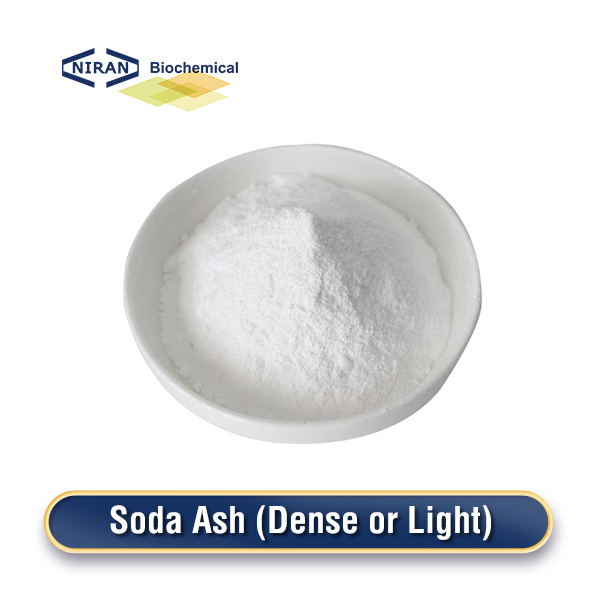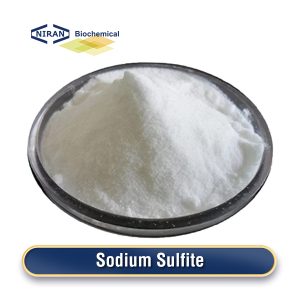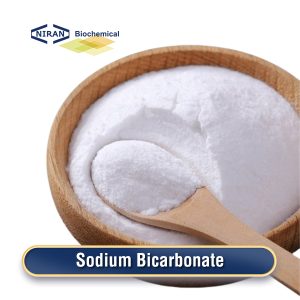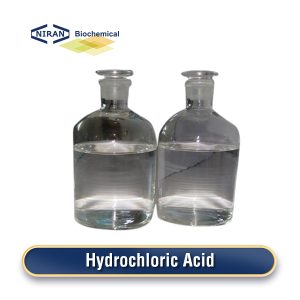Soda Ash
- CAS Number: 497-19-8
- Chemical Formula: Na2CO3
- MOQ: 1000KG
- Shelf Life: 2 years
- Types: Soda Ash Dense, Soda Ash Light
- Synonyms: Sodium Carbonate, Carbonic Acid, Disodium Salt
Product Description
What Is Soda Ash?
Soda Ash, otherwise known as sodium carbonate (Na₂CO₃), emerges as an elemental industrial chemical, presenting itself either in a powdery or crystalline white form. Its utility spans an array of applications from the manufacture of glass, and water treatment processes, to the formulation of detergents, and the synthesis of chemicals, underscoring its indispensable role in modern industry.
Production Methodologies:
- Solvay Process: This method entails the intricate interplay of ammonia, sodium chloride, and carbon dioxide, culminating in the formation of sodium bicarbonate, which, upon subsequent heating, yields sodium carbonate.
- Natural Extraction: Soda Ash is meticulously extracted from natural geological deposits such as Trona or Nahcolite, employing techniques of mining followed by sophisticated processing.
Related Parameters:
| Items | Standards |
| Soda Ash Dense | 99.2%min |
| Chloride(NaCl) | 0.70% max |
| Sulphate(SO4) | 0.03% max |
| BULK DENSITY | 0.90G/ML min |
| Iron(Fe2O3) | 0.0035% max |
| Water insoluble matter | 0.03% max |
| PARTICLE SIZE | 180um sieve remaining ≥ 70% |
| Items | Standards |
| Soda AshLight | 99.2%min |
| Chloride (NaCl) | 0.70% max |
| Sulphate (SO4) | 0.03% max |
| Arsenic | 0.10%max |
| Heavy Metals as Pb | 0.50%max |
| Iron (Fe2O3) | 0.0035% max |
| Water insoluble matter | 0.03% max |
| Whiteness | 80% min |
Recommended Dosage of Soda Ash Dense/Light:
| Applications | Dosage |
| Glass Manufacturing | 10%-30% |
| Detergents and Cleaning Products | 5%-10% |
| Water Treatment | 1%-5% |
| Fertilizer Production | 5% – 20% |
| Food Processing | 0.1%-0.5% |
| Chemical Production | 10% – 30% |
| Textile Industry | 5%–10% |
| Pharmaceutical Industry) | 0.1%–1% |
| Pulp and Paper Production | 3%-10% |
| Oil and Gas Industry | 1%-3% |
Soda Ash Has Wide Range of Uses:
- Glass Manufacturing: Soda ash serves to decrease the melting temperature of silica, thereby streamlining the glass production process and elevating the resultant product’s quality.
- Water Treatment: Through the precipitation of calcium and magnesium, soda ash ameliorates water hardness, thus rendering water softer for various applications.
- Detergent Production: It helps remove grease and stains, enhancing cleaning power.
- Chemical Manufacturing: Soda ash plays a pivotal role in the synthesis of an array of substances, including sodium bicarbonate, sodium silicates, and various phosphates.
- Textile Industry: Used in dyeing and treating cotton fibers for better dye absorption and fabric quality.
User Asked Question:
Q: What distinguishes Dense Soda Ash from Light Soda Ash?
A: Dense Soda Ash has larger particles and higher density, making it ideal for applications requiring slower dissolution, such as glass manufacturing and fertilizers. Owing to its compact structure, it is costlier and requires less storage space.
Light Soda Ash has smaller particles, lower density, and dissolves more quickly, making it suitable for detergent production, water treatment, and pharmaceuticals. Typically, it is more affordable, though its bulkier form means it needs more storage space. The decision is driven by the particular requirements of the industry.




